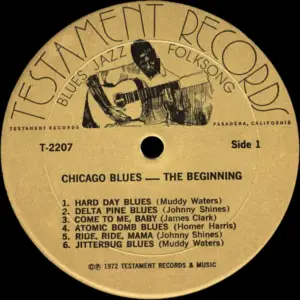PETE WELDING
 Some record companies are set up to exploit commercial markets and make their owners a lot of money, but Pete Weldon set up Testament Records with the aim of bringing hidden talents to the public. With a solid profession as a writer, Pete was more interested in having brilliant recordings in the can than having piles of money in the bank, so he was able to pursue his taste for the Blues, which sometimes ran to the wildly eccentric, without having a 'bean counter' getting in the way.
Some record companies are set up to exploit commercial markets and make their owners a lot of money, but Pete Weldon set up Testament Records with the aim of bringing hidden talents to the public. With a solid profession as a writer, Pete was more interested in having brilliant recordings in the can than having piles of money in the bank, so he was able to pursue his taste for the Blues, which sometimes ran to the wildly eccentric, without having a 'bean counter' getting in the way.
In 1962, Pete relocated to Chicago to follow his interest in the Blues, and he soon befriended Bob Koester owner of the Jazz Record Mart and Delmark Records. Deciding to start his own label to record the Blues players he heard every day who did not have record contracts, Pete went straight back to Philly to make recordings of Bill Jackson, which Testament Records put out as their first release, entitled 'Long Steel Rail'. When JFK was assassinated in November 1963, John Lee Granderson brought Pete a song called 'A Man for the Nation', so Pete asked other singers like Big Joe Williams, Otis Spann, mandolin player Johnny Young and many more to contribute their feelings on the tragedy, and he issued the results as 'Can't Keep from Cryin'. Around the same time, Delmark had an album by Peg-Leg Howell ready to go, but Bob was unsure of it's potential, so Pete released that on his Testament label.
Many lesser known Blues artists like Big John Wrencher, Dr. Ross, Blind Connie Williams and 'Maxwell St. Jimmy' Oden got their work released alongside Otis Spann, 'Shakey' Horton, Robert Nighthawk and Houston Stackhouse on Testament's Chicago Blues compilations. Pete also helped Muddy Waters to retrieve the tapes Alan Lomax made at Stovall's Plantation from the Library of Congress, and released those on Testament too. Pete found Johnny Shines working as a photographer at Chicago clubs, and got him into the studio to bring more authentic Delta Blues to the public. Other important Blues talents like Mississippi Fred McDowell, JB Hutto, Eddie 'Playboy' Taylor had albums issued by Testament in the 60s, many with Pete as producer.
